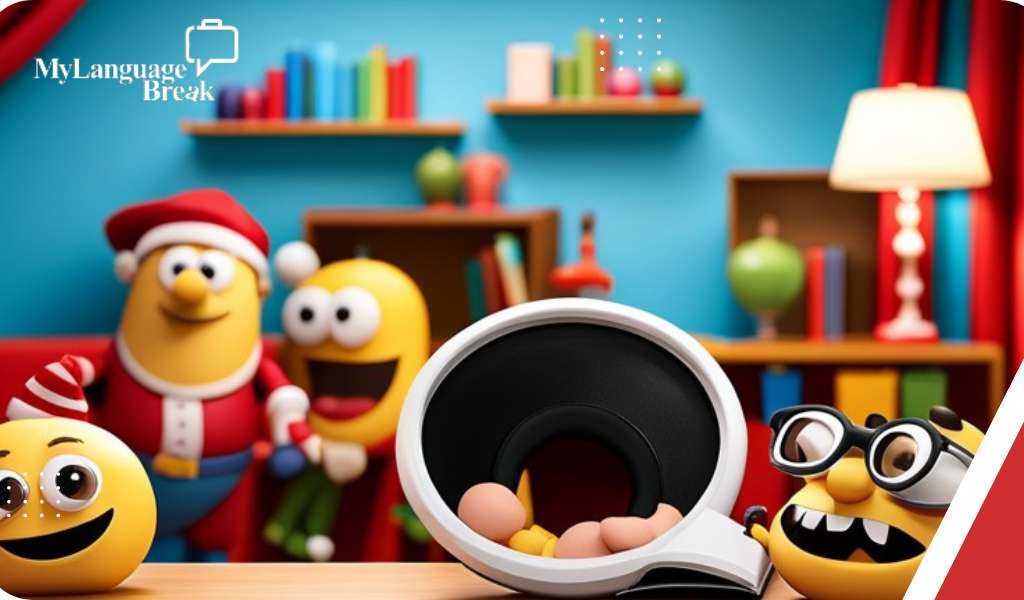Funny Spanish phrases that will enable you to speak like a native
Learning a language can be both challenging and frustrating. You may feel like you’re struggling to say three basic things in Spanish and there’s still so much vocabulary that you don’t know yet.
It is important to have patience and not feel discouraged: learning a new language takes time!
To make the process more fun, I am going to tell you about some funny Spanish phrases that will help you become fluent.

Ponte las pilas
This phrase literally means: put batteries on yourself. Its literal meaning is completely the opposite of what it’s used for, which is to motivate someone to get going or pick up their pace. It’s a fun way to tell someone that they need to work harder and be more productive.
For example: “Ponte las pilas o no vas a hacerme caso.” (You need to pick up your pace or you’re not going to listen to me.)
Comiendo moscas
This expression literally means: eating flies. It is used when referring to someone who looks bored and not interested in the conversation or activity they’re doing. Eating flies is a literal way to show boredom, so it’s only natural that this phrase would come out of it.
For example: “Está comiendo moscas y no me está escuchando.” (She’s so bored she’s not listening to me.)
Me pica el bagre
literal translation: “The catfish is itching me.”
It’s a slangy expression that means: “I’m really hungry.” It even sounds like it when you say it in Spanish (And I hope you’re rubbing your stomach now!) It’s not as specific as using the word hambre, but it is a more fun way of referring to it.
For example : “Estoy como el bagre.” (I’m starving.)
Ojo
This expression literally means: eye. But it has a different meaning depending on the context that it is used in. It can mean: eye in English, but it also means: “moment.” For example: “Ojo, esa no es mi novia” (Hey! That’s not my girlfriend).
It can also be used to warn someone that they might want to look out or pay attention. For example: “Ojo que el perro se riera. (Hey! The dog is looking at us.)
Creerse la última coca-cola en el desierto
This phrase literally means: to think yourself the last Coca-Cola in the desert. It is used to say that someone thinks they are the most important person in the room. The idea that someone is so important is represented by the idea of a Coke in a desert: everyone wants a Coke but there’s only one. So if you have one, you’re it! It also means that they think everyone wants to be them and want what they have.
For example: “Porque siempre se creen la última coca-cola en el desierto.” (Because they always think they are the most important person in the room.)
Corto de luces
This expression literally means: short of lights. It is used to describe someone who doesn’t understand something. This is because shorting out a light would make it go dark. So if you say that someone doesn’t understand something, they might not be able to explain it too well.
For example: “No entiendo por qué está corto de luces. Sólo tiene 13 años.” (I don’t understand why he doesn’t understand. He’s only 13 years old.)
Hablando del rey de Roma
This expression literally means: talking about the king of Rome. It can refer to someone who is bragging about their accomplishments or it can refer to someone who is talking too much about themselves and not listening to the subject being spoken of. Sometimes, your friend or distant friend brags a lot about him or herself and talks exclusively about them.
For example: “Este chico hace demasiado habla de si mismo. Hablando del rey de Rome.” (This guy brags too much about himself. He’s talking about himself.)
“Se habla del rey de Roma.” (They’re always talking about themselves)
Es el mismo perro con diferente collar [literally]
This is a phrase that means: it is the same dog with a different collar. It is used to say that someone isn’t any different than they were before. It’s just like the dog with a different collar: the dog doesn’t change but its appearance does.
For example: “Es el mismo perro con diferente collar. Lo que pasa es que se puso una corbata de rayas.” (It’s the same dog with a different collar. What happened was he put on a tie with stripes.)
Tirar / echar los perros a alguien
These two expressions are used to refer to someone who is extremely annoying. Tirar means “to throw,” so you can think of it as “prodding” or “poking” someone. You may use this phrase when you want to make fun of someone or tell them they bother you.
Echar means, literally, “to throw.” It refers to throwing something at another person or throwing oneself at another person. When you use this expression, it means that someone is bothering you, or you’re annoyed by them.
For example: “Juan es muy pesado. Me tira los perros todo el día.” (Juan is really annoying. He pokes at me all day.)

Burro hablando de orejas
This is an expression that literally means: talking donkey about ears. It is used in order to say that someone who doesn’t know what they are talking about is talking about something that they don’t understand.
For example: “Seguro que Ángel no sabe nada de operaciones porque está hablando de orejas.” (Ángel must not know much about operations because he doesn’t understand what he’s talking about.)
Hacer la pelota a alguien [literally]
This expression describes someone who is buttering someone up. “Buttering someone up” is a way to play someone or to act nice towards them and keep them on your side. “Pelota” is a Spanish-American folk term that describes the game of “catch.” It’s used when referring to someone who believes that they can get away with doing something because their friends will be able to cover for them, like when you’re in middle school and you decide not to do your homework and tell someone that the teacher said that no one has to do it, even though it’s your job.
For example: “El borracho siempre anda haciendo la pelota al jefe para quedar bien con él.” (The drunk guy always buttering up his boss in order to get along with him.)
Dejar de perder el tiempo
This expression literally means: to stop wasting time. It is used as a way of telling someone that they need to get moving or stop wasting time.
For example: “Cállate. Deja de perder el tiempo.” (Shut up. Stop wasting time.)
No hay nada como la música para cambiar la mirada [literally]
This expression literally means: there’s nothing like music to change one’s gaze. It is used to say that there’s nothing that can brighten someone’s day or make their mood better than a song can do, especially music they like.
For example: “No hay nada como la música para cambiar la mirada de ese chico que se enmudece frente a las chicas guapas.” (There’s nothing like music to change the way that guy looks when he sees a girl pretty. )
Salir amarrado sin importar lo que caiga [literally]
This expression literally means: to not care about what happens. It is used to describe a situation that is difficult to escape. “Amarrado” means tied up, and implies that the person who got themselves into this situation has no hope out of it, so they don’t even try.
For example: “Pedro salió amarrado sin importar lo que caiga.” (Peter didn’t care about what happened.)
Tener un trote miserable [literally]
This expression literally means: to have a miserable pace. It is used to describe someone who walks slowly. This person may be your friend, or someone you just met. You may hear this expression when you are going somewhere and you’re waiting for someone to hurry up and catch up with you, but they are walking so slowly that you end up leaving them behind.
For example: “Si tu amigo tiene un trote miserable, tú debes dejarlo atrás porque eso te va a dejar retrasado.z” (If your friend has a miserable pace, you should leave them behind because they’re going to keep you behind.)
Por la culpa de ese borracho
This expression literally means: because of that drunk one. It is used when someone does something wrong and you want to blame them, even though it’s not really their fault. “Borracho” is a term that refers to someone who is drunk. It is a way to say that the person who has done something wrong might be drunk but you’re blaming them for it.
For example: “No entiendo por qué hizo tu hermana eso si es claramente por la culpa de ese borracho.” (I don’t understand why your sister did that if it was clearly because of that drunk one.
No tener pelos en la lengua
Literal translation: not to have hair on one’s tongue.
This expression means: to not have any sense of shame. It is used to say that someone might be saying things that they shouldn’t, or that it’s okay for you to say something. It’s used like the expression, “to be outspoken.”
For example: “Tienes que ser más discreto, no tener pelos en la lengua.” (You need to be more discreet, not have any sense of shame.)
Meter la pata
Literal translation: to put one’s foot in.
This expression means: to make a mistake or go astray. “Pata” is the Spanish word for “hoof.” it is used to emphasize that someone has made a stupid mistake, or that something they’ve done has caused them to go astray.
For example: “Pese a toda la información que tenía, hizo una mala decisión y se metió de lleno en el lío. Lo hizo con su pata. ” (Even with all the information she had, she made a bad decision and went straight into the mess. She did it with her own foot.)
Estar haciendo por el mero placer [literally]
This expression means: to be doing it just for fun. It is used when you’re talking about something that you do without any intentions of accomplishing anything.
For example: “Estar haciendo por el mero placer es como arquear los brazos cuando uno no sabe a dónde soportar el peso.z” (To be doing things just for fun is like having one’s arms thrown up in the air when you don’t know how to hold something properly. )
No tener dos palabras [literally]
This expression means: not to have two words. It is used when someone doesn’t have anything to say at all.
For example: “Tú no me estás contando nada. No tienes dos palabras.” (You’re not telling me anything. You don’t have two words.)
Siempre me la ha hecho venir
This expression literally means: to always make me miss. It is used when you are talking about something that has happened repeatedly, and it annoys you for no reason.
For example: “Siempre me la ha hecho venir, y le tengo que tomar un café o dos.z” (S always makes me miss, and I have to take a coffee or two.)

Final thoughts:
Even though the Spanish language is one of the most widely spoken in the world, some expressions that we use in our daily lives cannot be translated directly into another language. In fact, it’s actually very interesting to note that expressions and sayings are a very important part of any culture. They’re often used as a way to say things that are more complex than what they really mean because people think they’re more fun to use in a conversation. We hope that you enjoyed learning Spanish language expressions and that you’ll be able to use them when you travel abroad!
Did you like these popular Spanish language sayings? Leave us a comment below and let us know what you liked or what you want! ?
Comments